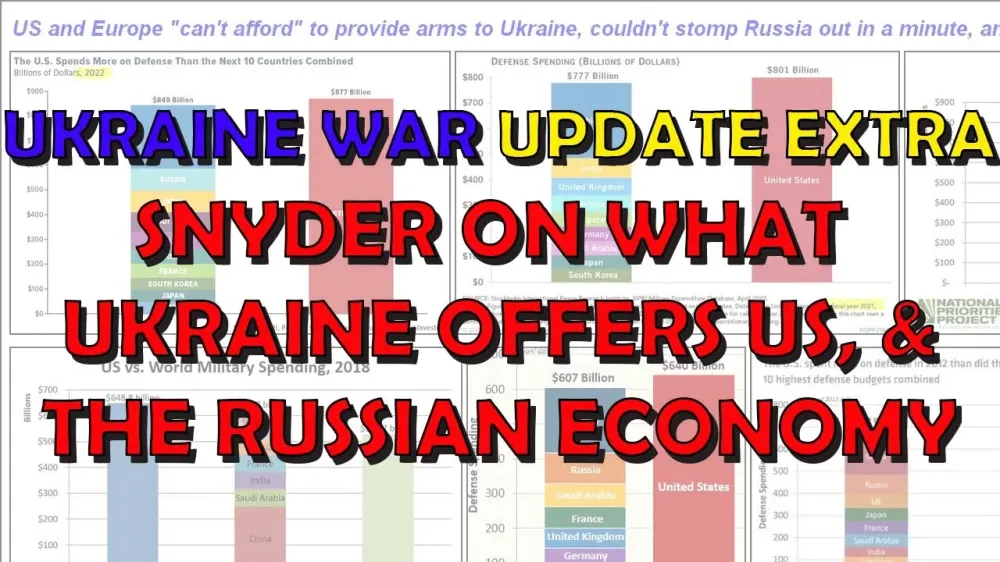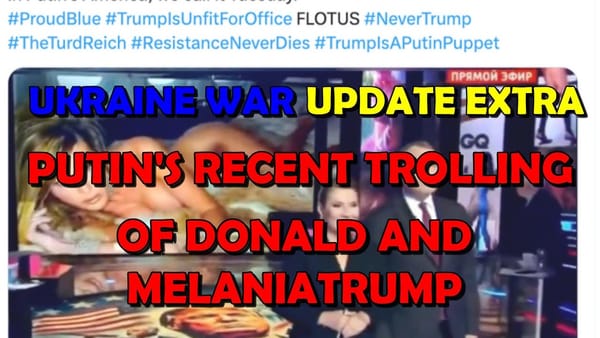Ukraine War Upd. EXTRA: Timothy Snyder on What Ukraine Offers Us, Ru Economy
Table of Contents 📖
"Ukraine is acting as a much more effective deterrence than the US ever could against China."
Hello Team
🎦 00:00-00:28⏩
Jonathan welcomes viewers to an "Extra" video, promising a deep dive and analysis of the war. He explains that these videos are less frequent than his regular news updates to avoid overload.
Return to top⤴️
Timothy Snyder on What Ukraine Offers the West
🎦 00:28-14:19⏩
Jonathan highlights a recent talk by historian Dr. Timothy Snyder, focusing on the often-overlooked contributions of Ukraine to the West during the war.
- Ukraine has prevented a genocide, resisting Russia's attempts and standing as a beacon against global atrocities. This resistance sets a precedent for defending against such aggression.
- Ukraine has defended the rules-based international order, demonstrating the importance of upholding international law and deterring actions like China's potential aggression toward Taiwan.
- Ukraine embodies the EU model of post-imperial cooperation, contrasting with Russia's imperialistic actions. Ukraine's commitment to democratic ideals amid global backsliding serves as a source of hope and inspiration.
- Ukraine effectively fulfills NATO criteria by repelling Russia's attack, showcasing the alliance's purpose. Jonathan questions NATO's relevance if it fails to adequately support Ukraine. He criticizes politicians who oppose aiding Ukraine while championing liberty and freedom, highlighting the hypocrisy.
- Jonathan challenges the narrative of limited US support, arguing that the $60 billion aid package, while seemingly substantial, represents a small fraction of US spending in Afghanistan and pales in comparison to the country's GDP and defense budget. He argues that the US could easily provide more without significantly impacting domestic programs and criticizes the slow pace of aid delivery.
- Jonathan emphasizes the symbolic importance of Ukraine's resistance against a nuclear power, proving that conventional forces can effectively deter aggression. He warns that a Russian victory would encourage nuclear proliferation, while a Ukrainian victory reinforces the viability of conventional deterrence.
- Jonathan expresses concern over Ukraine's efforts being taken for granted and urges viewers to recognize their significance. He emphasizes the need for greater awareness and support for Ukraine's sacrifices.
Russian Economy Update - Intro
🎦 14:19-14:49⏩
Jonathan introduces the next topic: the state of the Russian economy. He references a paper by Alexandra Prokopenko for the Carnegie Endowment Institute, summarizing her key findings. Prokopenko argues that Russia's economy, while seemingly stable amid sanctions, remains precarious. Jonathan will delve into specific points she makes.
Return to top⤴️
Russia's Economic Resilience: Factors & Analysis
🎦 14:49-26:05⏩
Jonathan dissects the factors contributing to Russia's economic resilience:
- Sanctions Paradox: While hindering growth, sanctions have inadvertently shielded Russia from global shocks. He notes that Russia's adaptation to sanctions since 2014, particularly the de-dollarization efforts, has insulated its economy. He cites the example of Russia's market remaining unaffected by the US banking crisis in 2023.
- State Spending Surge & GDP Growth: He acknowledges the surge in Russian state spending (over 10% of GDP), primarily directed toward the military. While this boosts GDP figures, he questions the sustainability of such growth, calling it a "fake buoyancy."
- Oil Price Dependency: He analyzes the oil price cap's impact, stating that a $10 drop per barrel would significantly strain the Russian budget. Despite this vulnerability, the Russian government has signaled fiscal tightening for 2025. Jonathan draws parallels to UK austerity measures, arguing that such belt-tightening could stifle economic growth. He criticizes the short-sightedness of focusing on inflation control while neglecting long-term economic consequences.
- China's Growing Influence: Jonathan highlights Russia's increased reliance on China, with Beijing holding a near-monopoly on various exports to Russia. He argues that this dependence gives China significant leverage over Russia's economy, exemplified by the rising use of yuan in Russian trade. He expresses concern over Russia's vulnerability in this relationship.
- Long-Term Challenges & Unsustainable Fixes: Jonathan highlights the long-term challenges Russia faces, emphasizing the impact of technology sanctions, brain drain, and the focus on commodities. He also discusses the social impact of Russia's war economy, noting the rising cost of living and potential discontent among those benefiting from war-related income.
Jonathan concludes this segment by acknowledging the complexities of the situation. He challenges simplistic views that Russia is on the brink of collapse, suggesting that the country still has means to manipulate its economy, although not sustainably. He invites viewers to share their opinions on Russia's economic trajectory.
Return to top⤴️
Discussion Recommendations - Russia, UN and US Corruption
🎦 27:49-37:45⏩
Jonathan recommends several other videos and articles for viewers:
- Russia's UN Status Debate: He urges viewers to watch his conversation with Talaria, discussing Russia's questionable membership in the UN and the lack of awareness surrounding this issue.
- Sean Pinner Interview: He strongly recommends his interview with Sean Pinner, a British national captured and tortured by Russian forces in Mariupol. Jonathan expresses disappointment over the low view count, emphasizing the importance of Pinner's story.
- Talaria's Substack - Knowledge is Power: Jonathan promotes Talaria's Substack, specifically her work on Russia's UN status and her infographic highlighting the US and Europe's ability to provide arms to Ukraine.
- Sheldon Whitehouse's Presentation on US Corruption: He recommends a presentation by Senator Sheldon Whitehouse, exposing the influence of dark money and corruption within the US Supreme Court.
- Corporate Influence in the Ukraine War: Jonathan connects Whitehouse's presentation to the discussion about corporate influence on US policy, suggesting that companies like ExxonMobil and Chevron, with significant interests in Russia, may be pressuring the Biden administration to discourage Ukrainian attacks on Russian oil refineries.
- Visual Capitalist Infographics: He recommends exploring Visual Capitalist's infographics on global energy production, highlighting the dominance of certain nations in oil, gas, and coal.
Wrap up
🎦 37:45-37:56⏩
Jonathan thanks viewers for watching and gives a special shout-out to Talaria for sharing valuable information. He encourages viewers to check out their conversation about Russia's questionable UN membership.
Return to top⤴️



